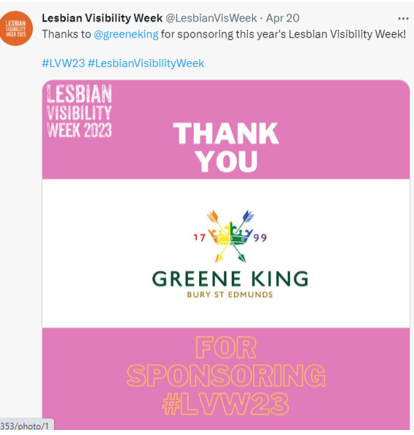#LesbianVisibilityWeek kicked off with the announcement by Just Like Us that 79% of lesbians in their study felt ashamed. With the caveat that we don’t know how the research was conducted or who was included as a young lesbian, this figure is really concerning. 

As lesbians and researchers, a result like this raises lots of questions for us. Are young lesbians ashamed of being part of a bigger ‘community’, or of being lesbian full stop? Which factors help account for this? What do these young lesbians need to improve their wellbeing?
Sadly, #LesbianVisibilityWeek isn’t going to provide any answers to these questions. A quick look at the official website for the week, lesbianvisibilityweek.com, informs us that the week is ‘powered by DIVA and Stonewall’.
We don’t need to say much about Stonewall, or its CEO Nancy Kelley’s habit of positioning lesbians as ‘sexual racists’. The reputation of Stonewall among lesbians is well-established. Here’s Nancy celebrating a male ‘lesbian’ for LVW. 

DIVA, the other org behind the LVW website, released its own research this week. DIVA is in no position to improve matters for young lesbians, as its research showed that only 24% of its young survey-takers said they were lesbians. We don't know the male/female split here. 

The DIVA power list, also released for #LesbianVisibilityWeek, doesn’t look like it has much to offer young lesbians either. 

The official #LesbianVisibilityWeek Twitter account, @LesbianVisWeek, has at times appeared too distractedly self-satisfied with the project’s haul of sponsorship money to remember that the week is about lesbians at all. 







There are, of course, many heartening and uplifting posts being made by individual lesbians and unfunded lesbian groups for #LesbianVisibilityWeek, and we hope that any lesbians in need of solace or a sense of community are seeing these.
Our prevailing mood this week is anger, though. 79% of young lesbians in @JustLikeUsUK’s study said that they felt shame. This should be a major focus for LVW. But the main architects of #LesbianVisibilityWeek, evidenced by their own figures, predominantly reach non-lesbians.
We’re sick of hearing about this commercial jamboree, populated with lazy sponsors repeating the gender ideology slogans they’ve been asked to use, and older lesbians who, far from centring lesbians, offer up our words and our boundaries to the highest bidder.
The evidence points to an urgent need to research the apparent wellbeing crisis in young lesbians.
We think that for this to be done justice, there needs to be professional research situated far away from the #LesbianVisibilityWeek circus and the money and power which drive it.
We think that for this to be done justice, there needs to be professional research situated far away from the #LesbianVisibilityWeek circus and the money and power which drive it.
• • •
Missing some Tweet in this thread? You can try to
force a refresh

 Read on Twitter
Read on Twitter






